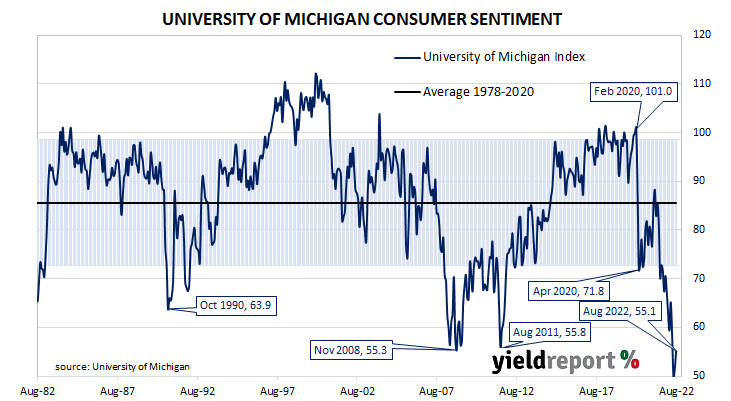Summary: University of Michigan consumer confidence index firms in July, above consensus expectations; views of present conditions deteriorate, future conditions improve; expectations improvement notable among low, middle income groups; may “soothe” concerns about spiralling fall in private demand.
US consumer confidence started 2020 at an elevated level but, after a few months, surveys began to reflect a growing unease with the global spread of COVID-19 and its reach into the US. Household confidence plunged in April 2020 and then recovered in a haphazard fashion, generally fluctuating at below-average levels according to the University of Michigan. The University’s measure of confidence had recovered back to the long-term average by April 2021 but then it plunged again in the September quarter and has since remained at historically low levels.
The latest survey conducted by the University indicates confidence among US households firmed on average in August. The preliminary reading of the Index of Consumer Sentiment registered 55.1, above the generally expected figure of 52.0 as well as July’s final figure of 51.5. Consumers’ views of current conditions deteriorated while expectations regarding future conditions improved in comparison to those held at the time of the July survey.
“All components of the expectations index improved this month, particularly among low and middle income consumers for whom inflation is particularly salient,” said the University’s Surveys of Consumers Director Joanne Hsu.
Short-term US Treasury bond yields moved higher on the day while longer-term yields moved lower. By the close of business, the 2-year Treasury yield had gained 6bps to 3.25%, the 10-year had shed 6bps to 2.83% while the 30-year yield finished 7bps lower at 3.11%.
“The improvement in the overall index will soothe some concerns about a spiralling fall in private demand, though to the extent that such a dynamic might be precisely what the Fed requires in practice to beat inflation might be a double-edged sword,” said ANZ Head of Australian Economics David Plank.
It was once thought less-confident households are generally inclined to spend less and save more; some decline in household spending could be expected to follow. However, recent research suggests the correlation between household confidence and retail spending is quite weak.


